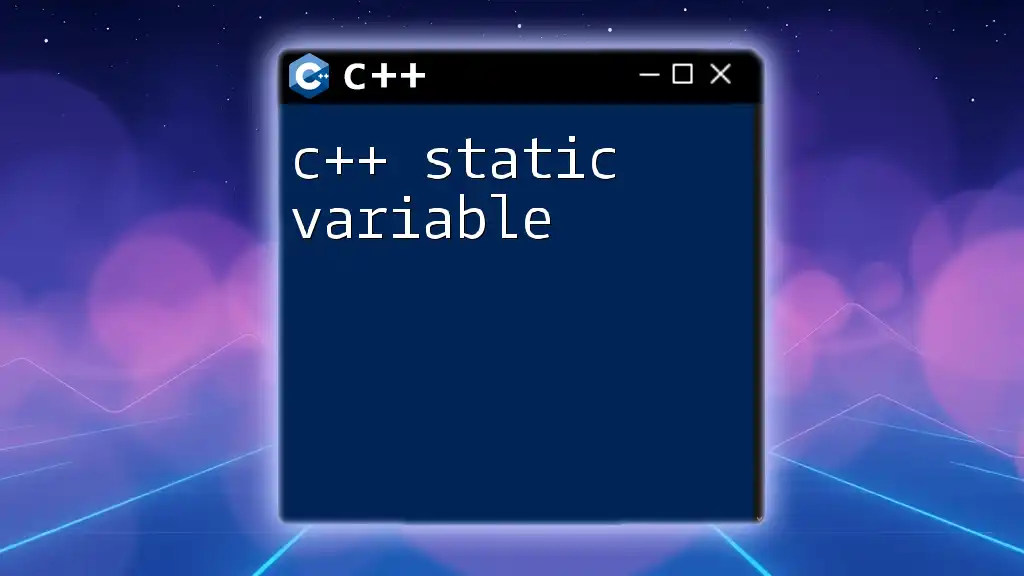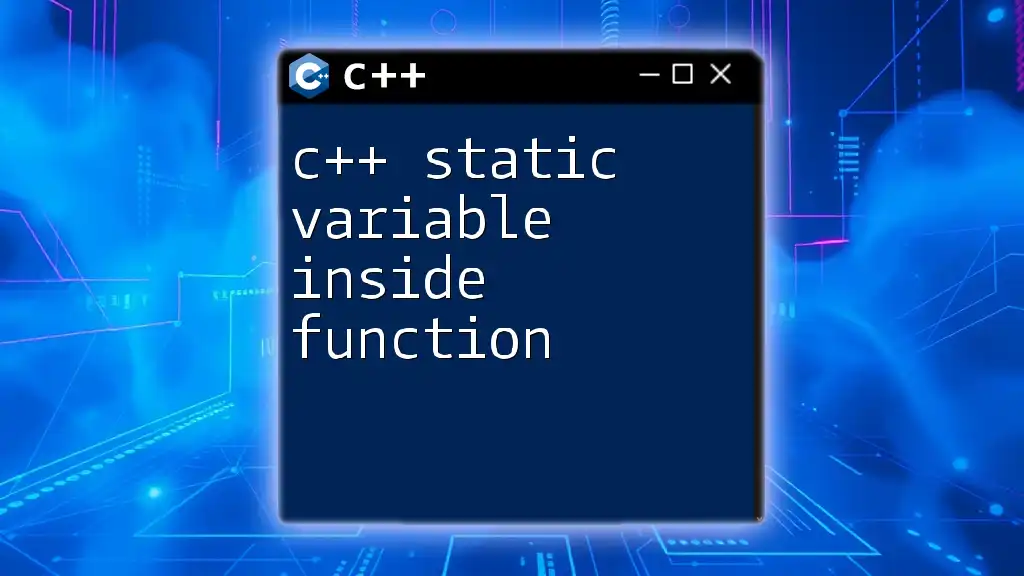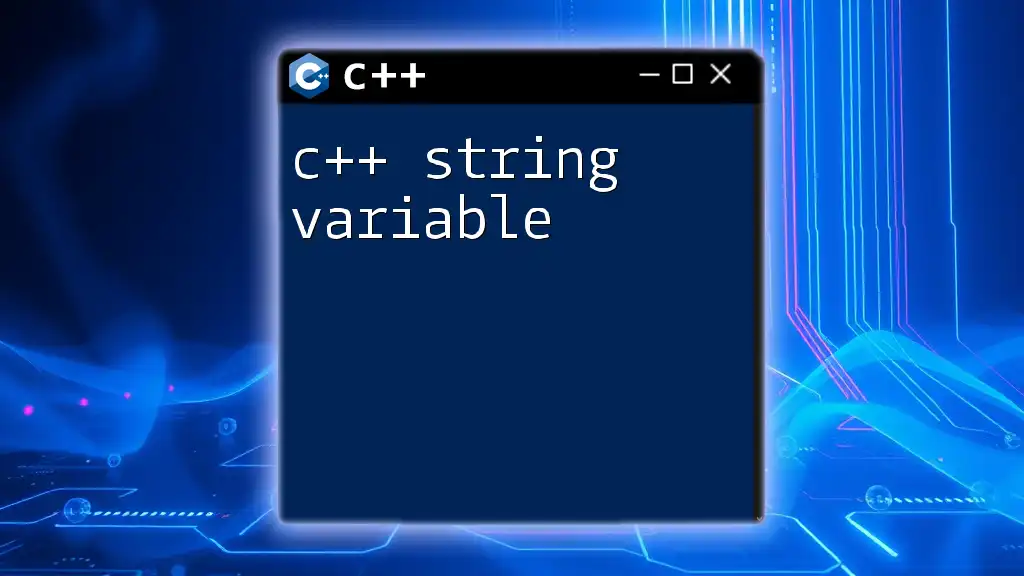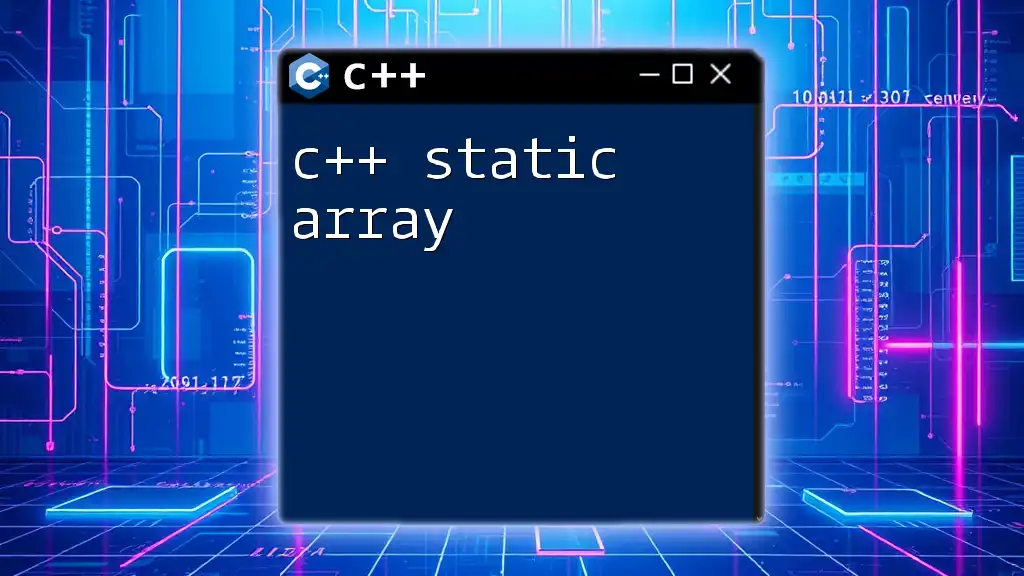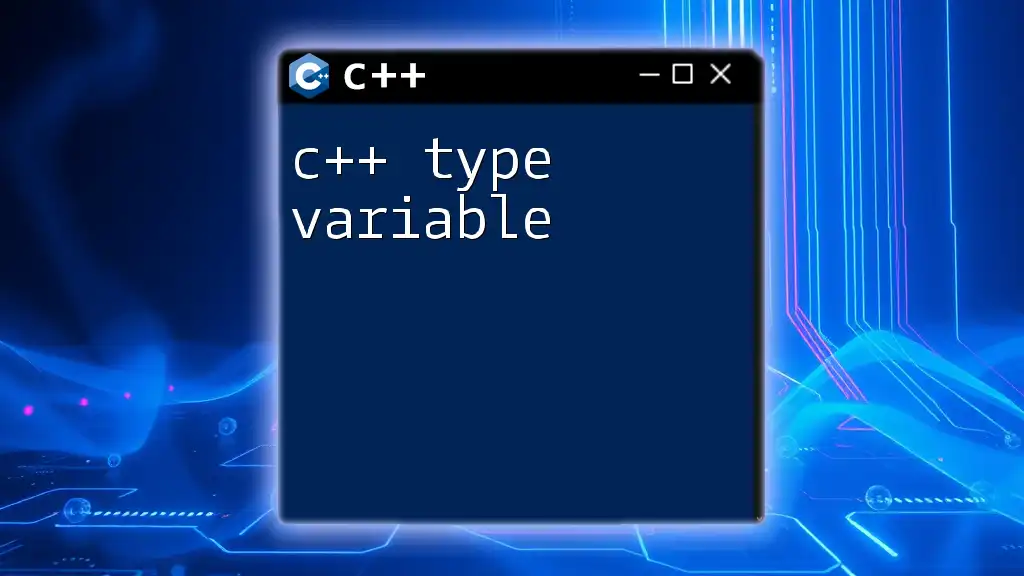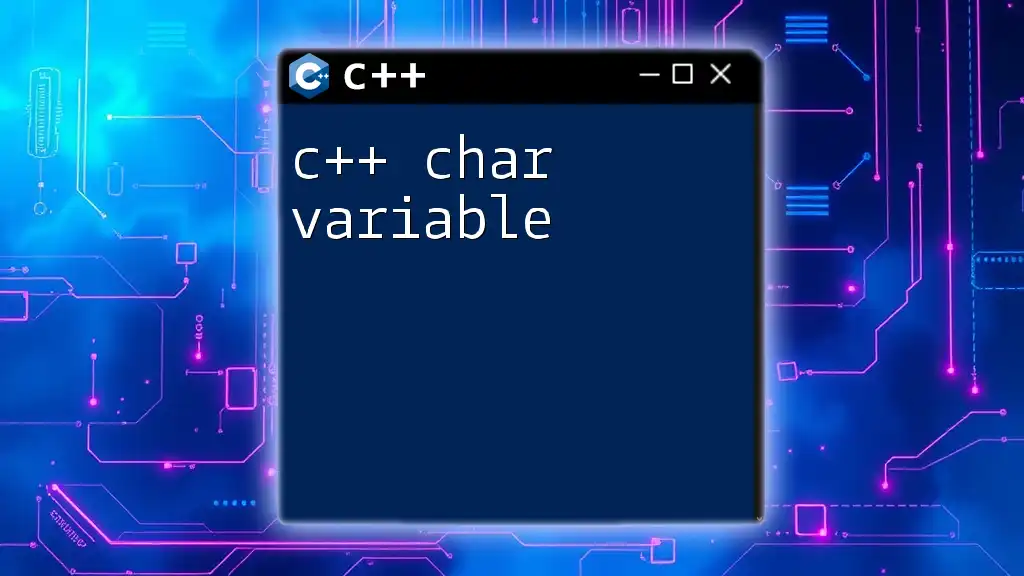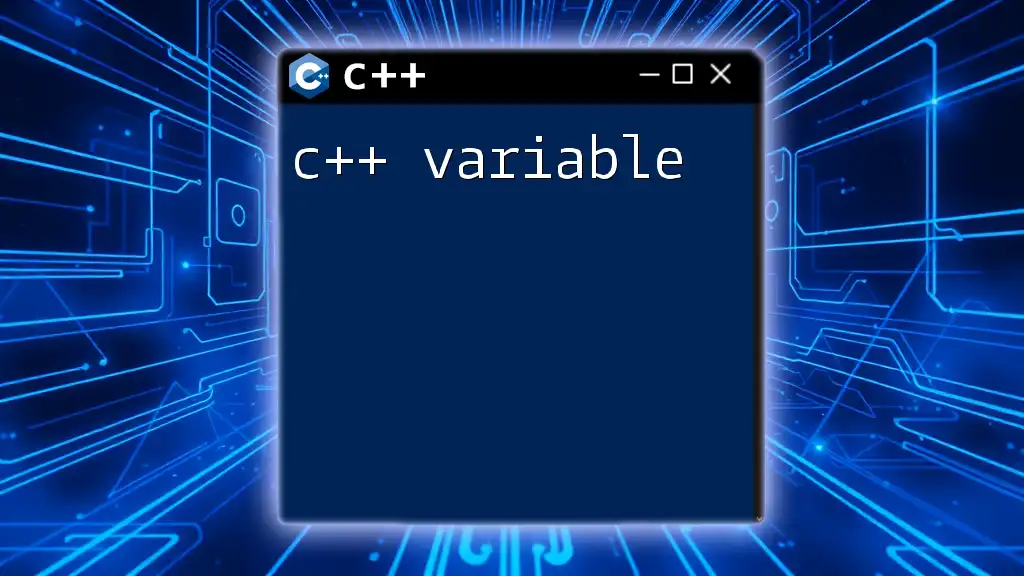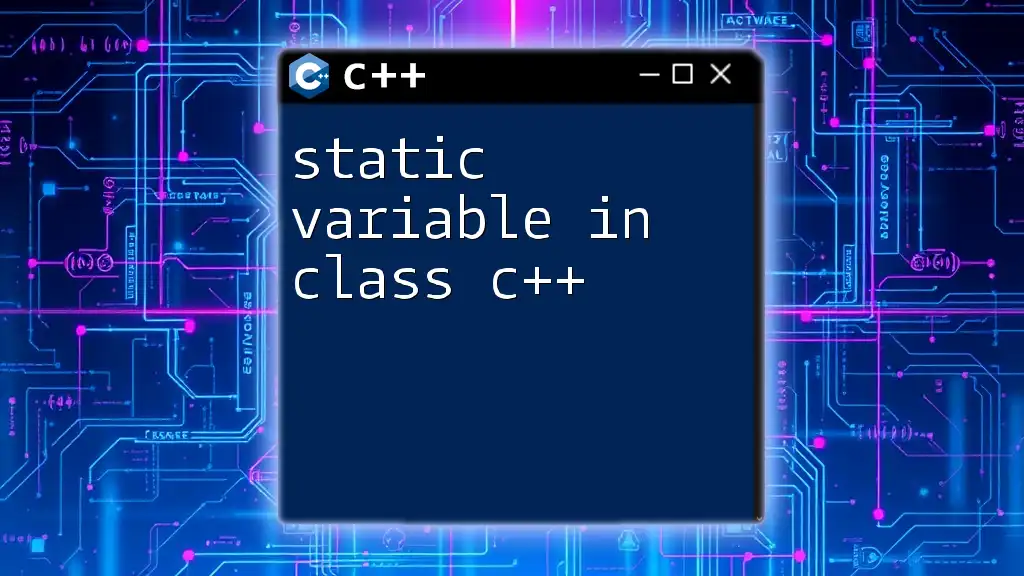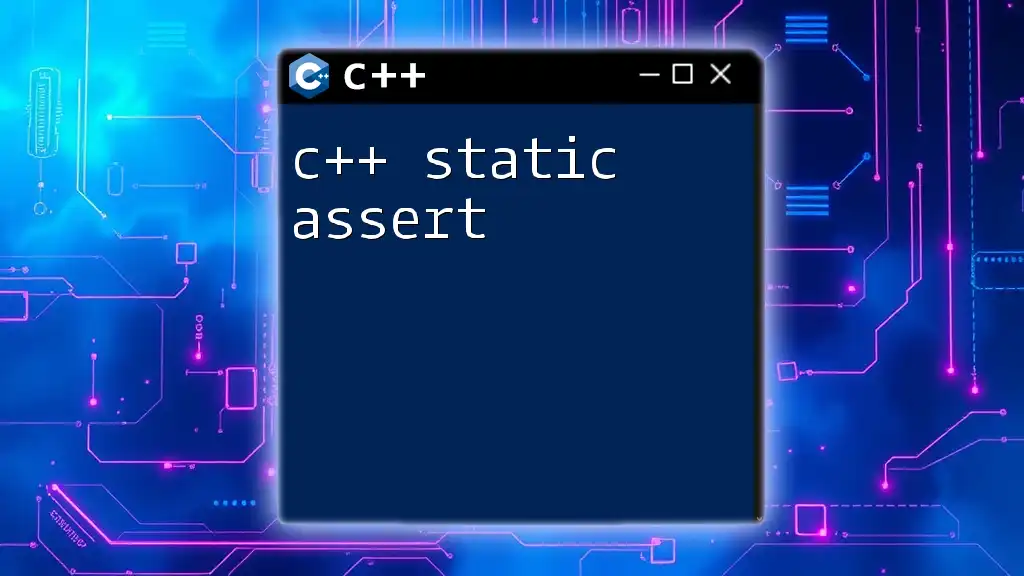A C++ static variable maintains its value between function calls and is initialized only once, having a global lifetime but local scope.
#include <iostream>
void countCalls() {
static int count = 0; // static variable
count++;
std::cout << "Function called " << count << " times." << std::endl;
}
int main() {
countCalls(); // Output: Function called 1 times.
countCalls(); // Output: Function called 2 times.
countCalls(); // Output: Function called 3 times.
return 0;
}
Understanding C++ Static Variables
Introduction to Static Variables
In C++, static variables are special types of variables that maintain their value even after they go out of scope. They are not destroyed after function execution, allowing them to preserve their state across multiple calls. Understanding how to utilize static variables effectively can enhance memory management and improve your programs' efficiency.
Types of Static Variables
Static Local Variables
Static local variables are declared within a function and are only accessible within that function's scope. Despite their local declaration, these variables retain their value for the life of the program.
Example:
#include <iostream>
using namespace std;
void function() {
static int count = 0; // static local variable
count++;
cout << "Count: " << count << endl;
}
int main() {
function(); // Output: Count: 1
function(); // Output: Count: 2
function(); // Output: Count: 3
return 0;
}
In this example, the `count` variable retains its value between calls to `function()`, demonstrating how static local variables can provide persistence in state.
Static Global Variables
Static global variables are defined outside of any function and cannot be accessed from other translation units, leading to improved encapsulation of functionality.
Example:
#include <iostream>
using namespace std;
static int globalCount = 0; // static global variable
void incrementGlobalCount() {
globalCount++;
}
int main() {
incrementGlobalCount();
incrementGlobalCount();
cout << "Global Count: " << globalCount << endl; // Output: Global Count: 2
return 0;
}
Here, the `globalCount` variable can only be accessed within the same source file, ensuring that other parts of the program cannot unintentionally modify it.
How Static Variables Work
Memory Management of Static Variables
Static variables are stored in the data segment of memory rather than the stack. Upon program start, they are allocated memory and initialized. Importantly, they remain in memory until the program terminates, distinguishing them from automatic variables, which are stored on the stack and are released once they go out of scope.
Lifetime and Initialization of Static Variables
The lifetime of static variables starts when the program is initialized. They are initialized only once, at the start of the program. If not explicitly initialized, static variables are automatically initialized to zero, making them safer in some contexts compared to automatic variables.
Advantages of Using Static Variables
Persistence of State
Static variables excel in scenarios where it's crucial to retain the value between function calls. This feature makes them ideal for tasks like counting or caching.
Encapsulation
Static global variables provide a protective barrier, ensuring that the variable's scope remains confined within a single translation unit. This aspect aids in protecting data integrity and modular design in larger projects.
Reduced Memory Footprint
By utilizing static variables, you optimize memory usage as they don't consume stack space each time a function is invoked, especially if the function is called multiple times.
Common Use Cases of Static Variables
Function Call Counters
Static variables are extensively used to count how many times a specific function has been executed. This can be particularly useful for logging purposes or performance metrics.
Example:
#include <iostream>
using namespace std;
void callCounter() {
static int callCount = 0; // preserving the value of callCount
callCount++;
cout << "Function called: " << callCount << " times." << endl;
}
int main() {
callCounter(); // 1
callCounter(); // 2
callCounter(); // 3
return 0;
}
Caching Results
Static variables can store computed results that may need to be frequently accessed, avoiding repetitive calculations and enhancing performance.
Example:
#include <iostream>
using namespace std;
int slowFunction() {
static int lastResult = 0;
// Assume this function has an expensive computation
lastResult += 100; // Incrementing for demonstration
return lastResult;
}
int main() {
cout << slowFunction() << endl; // Output: 100
cout << slowFunction() << endl; // Output: 200
return 0;
}
Singleton Design Pattern
The Singleton pattern, which ensures that a class has only one instance, often relies on static variables for its implementation. This usage highlights the importance of static scope and lifetime management in controlling instance creation.
Best Practices for Using Static Variables
When to Use Static Variables
Static variables are beneficial when you need to preserve a value between function calls or maintain status without global exposure. However, they should be used judiciously to avoid unintended side effects.
Initialization Considerations
Static variables should be initialized once and only when the program begins. Ensure that the initial value is accurately set to avoid unexpected behavior in your program.
Code Readability and Maintenance
Although static variables can be useful, overuse might lead to code that is hard to read and maintain. Ensure that their use is justified and clearly documented within the code.
Potential Drawbacks of Static Variables
Thread Safety Issues
When using static variables in multi-threaded applications, care must be taken to ensure that they are accessed in a thread-safe manner. This might require implementing locks or other synchronization techniques.
Unintended Side Effects
Static variables maintain their state, which can lead to bugs if not managed carefully. For example, if function logic changes without realizing the implications of static state retention, unexpected results can occur.
Debugging Challenges
Debugging functions with static variables can be more challenging since the variables retain their state between calls. This persistence complicates understanding variable values upon function entry and exit.
Conclusion
C++ static variables offer a powerful way to manage state reliably and efficiently. They provide a unique blend of memory management and encapsulation, which can make programs more efficient and easier to maintain when used correctly. As you work with C++, experimenting with static variables can lead to better understanding and mastery of the language.
Additional Resources
- C++ documentation on static storage duration
- Recommended books and tutorials on advanced C++ concepts
- Online C++ coding platforms for practice and real-world applications

